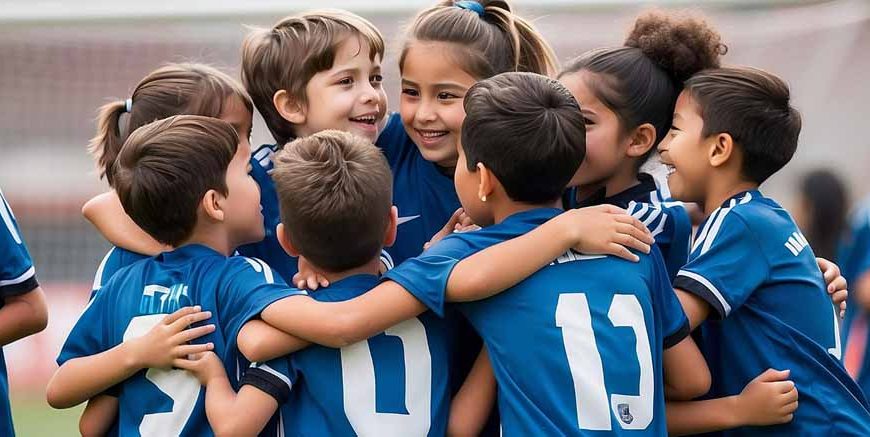‘It’s all about Teamwork!’
Said every Parent and Teacher to a child, when educating them about the ways of the world. Alas! It’s far easier said than done.
It’s true. No matter how rosy a picture we might paint about the Benefits of Teamwork, the Importance of Teamwork is soon lost on children. Only a short while after they have started working on something together, will you find voices of dissent. Teamwork for Kids, after all, is nothing short of being a ‘practice’ that needs to be worked upon. Time and again!
In this article, we at EuroKids strive to show you not only the Importance of Teamwork for Kids, but also how to Develop Teamwork Skills in children. We are of the firm opinion that when it comes to Life Skills Development, Teamwork is one of the founding pillars. Are you ready to learn all about developing Teamwork for Kids? Get started, with a look at what the Benefits of Teamwork truly are.
Teamwork for Kids: The Importance of Teamwork
The Importance of Teamwork for Kids cannot be overestimated! Presenting a look at some of the most important Benefits of Teamwork for Kids.
- It teaches them to Listen
- It helps kids imbibe the true meaning of the term ‘Diversity’
- A Boost to their Confidence
- They form Better Relationships with their Peers
If your child is thinking about being part of a team but doesn’t want to listen to others, they have lost the plot already!
Fact: Learning how to listen to others is the first step in ‘Communication’.
Bonus Fact: There is plenty of ‘listening’ to be done vis-a-vis Teamwork for Kids. For instance, listening to what their role in the team is. Then, listening to the other members of the team so that everyone is on the same page!
It’s very easy to say things like ‘I’m all for diversity’, but do we really practice what we preach? It’s important to teach our kids at a young age that all people are important, irrespective of things like the colour of their skin. This is where Teamwork does a great job, of getting children to respect their peers who are ‘different’ from them.
When kids get to be part of a team, they come to realize that their opinion is actually ‘valued’. This serves to boost their confidence greatly, paving the way for their participation in further team activities.
It’s through the process of collaborating with other kids on a project or two, that children learn to understand them better. This ensures that they form better friendships with them in turn!
Learning How to Develop Teamwork Skills in Children
Looking to teach your child a Teamwork Skill or two? In this section we shall see how to get your children to develop teamwork skills. Ready to get started? Let’s begin, with a look at how to develop teamwork skills in kids at home!
Teamwork Skills for Kids: At Home
Presenting ways our children can learn Teamwork Skills, within the environs of our home itself.
- Playing Board Games
- Create a Story together
- Putting on a Play or Concert
You heard that right! Playing Board Games like Jenga and Scrabble, make for a cool, fun way to teach your child Teamwork!
Fact: It’s things like ‘waiting for their turn’ and ‘collaborating with others’ as they play these games, that helps sharpen those teamwork skills.
Another great way to sharpen that Teamwork Skill, is to have them write a work of fiction with you. Begin by writing the first page, and then let your child write the second. Then go even further. Doing this is not only fun, it will also help sharpen that Teamwork Skill known as ‘Collaboration’!
As much fun as this one sounds, it is quite ‘elaborate’ vis a vis the amount of teamwork that is needed to get the event up and running.
Teamwork for Kids: In the School
The School is also a place where Teamwork can be taught most effectively to children. Like in the following instances.
- Playing Tug-of-War
- Working on Projects
- Reflecting on their Contributions
One of the ways that kids learn best is through the act of Playing! Indulging in a game of tug-of-war is a fun way to get them to see that it is the ‘collective’ effort of the ‘team members’ that is responsible for the outcome.
When they work with other kids on the same project, they will know the true meaning of everyone being on ‘the same page’.
After the children have worked on a project together, it is absolutely vital for them to reflect on what their contributions to the group might have been. This is a great way for them to make an honest assessment of their individual performance, and reflect on ways in which they can be better team members in the future.
At EuroKids we believe that Teamwork for Kids is one of the top skills to work on, when it comes to the development of vital Life Skills in kids. We encourage you to use the pointers outlined in this article, to help your child develop Teamwork Skills.

















